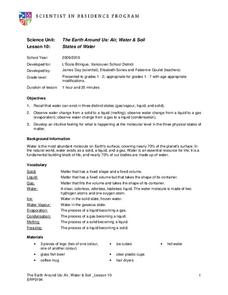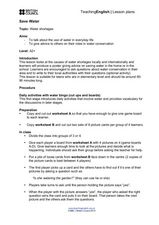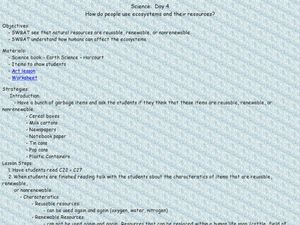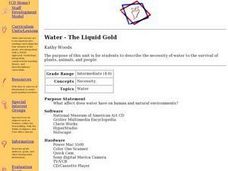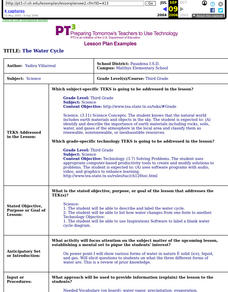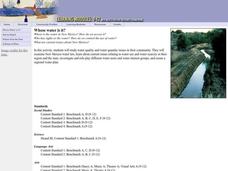Curated OER
Water Reflections:
Students analyze data from monitoring activities . They summarize, post, and present the data from activities. They tell others in the community what they've learned about local water quality.
Curated OER
A Potting We Will Go
Students read A Tree is Nice and It Could Still Be a Tree. In this tree planting lesson, students compare and contrast private property and common resources. Students identify the needs of a tree and follow the directions to plan a tree...
Curated OER
States of Water
Students investigate the 3 states of matter. In this physical science "matter" lesson, students observe and participate in a number of demonstrations involving melting and freezing water. Students observe the effect heat has on changing...
Curated OER
Wise Use of Our Resources
In this resources activity, students will categorize 10 resources as either a renewable or nonrenewable resource. Students will then complete 2 short answer questions.
Foundation for Water & Energy Education
Perpetual Flow Activity
Set up a demonstration of how gravity can drive the perpetual flow of water during your hydro power unit. Science learners work in teams to make observations and formulate questions about how it works. They compare the model to what they...
Curated OER
Tale of a Tuna
Junior marine biologists access the International Commission for the Conservation of Atlantic Tunas' data on Atlantic Bluefin Tuna catches. As they analyze the data, they answer three questions. Background information and links to...
Curated OER
Water Shortages
Students explore natural elements by participating in a bingo activity. In this water usage lesson, students discuss the importance of clean water and complete worksheets based on water shortage statistics. Students utilize flashcards to...
Curated OER
How do people use ecosystems and their resources?
Students examine how natural resources are reusable, renewable or nonrenewable. In this ecosystems lesson students see the effects humans have on ecosystems and complete an art lesson activity.
Alabama Wildlife Federation
Wildlife Habitat Checklist
Take a walk on the wild side with a project about animal habitats. After kids observe a chosen animal in its home, they describe the animal's food and water sources, shelter, and how it raises its young. They then write a short fictional...
Project WET Foundation
Explore Watersheds
What makes a watershed? What are the natural and human features of a watershed? How do human features affect watersheds? Where can I find my local watershed? These questions are thoroughly explained in an informative watershed interactive.
Virginia Department of Education
The Hydrologic Cycle
There is the same amount of water on earth now as there was when it was formed. The water from your faucet could contain molecules that dinosaurs drank! Young scientists build their own hydrologic cycle model and observe it for five...
Kenan Fellows
The Little Stuff Can Make a Big Difference
Great things come in small packages! What better way to illustrate this point than a week-long look at nanotechnology? Earth science scholars explore water quality issues through lab activities, then research new innovations in nanotech...
Tech Museum of Innovation
Seed Dispersal
Engineering challenges are not just man-made ... nature has its own set of them. A hands-on STEM activity has groups designing a seed dispersal system. Each group can only use one sheet of paper — a tough task!
Curated OER
Cherishing the Water of Life
Students work in small groups to brainstorm a list of all creatures, plants, natural, and artificial processes that use or depend on fresh water. The class views an aquarium filled with water representing all the water in the world. The...
Curated OER
Water Resources
Students study water resources that are important to the people of North American and Africa. They use satellite images and data to explore how human actions can degrade, improve, or maintain water resources. They analyze and interpret...
Curated OER
The Cool Forms of Water
Students discover the different forms of water on Earth. For this states of water lesson, students read material on the different forms of water and how they are created. The students answer written questions on worksheets.
Curated OER
Water-The Liquid Gold
Students investigate the necessity of water for the survival of plants, animals, and people. They explore the affect that water has on human and natural environments through literature, field trips, and discussions.
Curated OER
The Water Cycle--Using Inspiration Software
Third graders describe and label the water cycle, and list how water changes from one form to another; students use Inspiration Software to label a blank water cycle diagram.
Curated OER
Whose Water is It?
Learners study water quality and water quantity issues in their community. They will examine state water laws, learn about current issues relating to water use and water scarcity in their region and the state, investigate and role play...
Curated OER
WHO Wants Clean Water! Do You? Solving Conflicts Over International Water Rights Issues
High schoolers examine the water rights on an international scale. In this social studies lesson, students research on a specific water rights issue. They write a paper about their findings and create a PowerPoint presentation which they...
Curated OER
Testing Your Water
Students perform several water quality tests on groundwater from their area. They use test strips to determine the pH, hardness, alkalinity, nitrates, iron and chloride levels.
Curated OER
The Environment and the Community
Students consider ways to reduce air, water, noise, and litter pollution in their community. In this environment lesson plan, students discuss and set goals for reducing pollution and keep a log of the changes they make individually to...
Curated OER
Making Recycled Paper
Young scholars explore the advantages of recycling paper. In this environmental instructional activity, students produce recycled paper by ripping up paper and putting it into a blender with water to create a mixture. Young scholars use...
Curated OER
Water Magic
Young scholars conduct experiments with ice, water and steam to observe the water cycle. They discuss substances that water accumulates from the Earth as it moves through its cycle.




